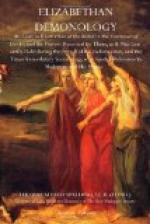IV.
111. Fairies and devils differ in degree, not in origin. 112. Evidence. 113. Cause of difference. Folk, until disturbed by religious doubt, don’t believe in devils, but fairies. 114. Reformation shook people up, and made them think of hell and devils. 115. The change came in the towns before the country. Fairies held on a long time in the country. 116. Shakspere was early impressed with fairy lore. In middle life, came in contact with town thought and devils, and at the end of it returned to Stratford and fairydom. 117. This is reflected in his works. 118. But there is progression of thought to be observed in these stages. 119. Shakspere indirectly tells us his thoughts, if we will take the trouble to learn them. 120. Three stages of thought that men go through on religious matters. Hereditary belief. Scepticism. Reasoned belief. 121. Shakspere went through all this. 122. Illustrations. Hereditary belief. “A Midsummer Night’s Dream.” Fairies chiefly an adaptation of current tradition. 123. The dawn of doubt. 124. Scepticism. Evil spirits dominant. No guiding good. 125. Corresponding lapse of faith in other matters. Woman’s purity. 126. Man’s honour. 127. Mr. Ruskin’s view of Shakspere’s message. 128. Founded chiefly on plays of sceptical period. Message of third period entirely different. 129. Reasoned belief. “The Tempest.” 130. Man can master evil of all forms if he go about it in the right way—is not the toy of fate. 131. Prospero a type of Shakspere in this final stage of thought. How pleasant to think this!
ELIZABETHAN DEMONOLOGY.
1. It is impossible to understand and appreciate thoroughly the production of any great literary genius who lived and wrote in times far removed from our own, without a certain amount of familiarity, not only with the precise shades of meaning possessed by the vocabulary he made use of, as distinguished from the sense conveyed by the same words in the present day, but also with the customs and ideas, political, religious and moral, that predominated during the period in which his works were produced. Without such information, it will be found impossible, in many matters of the




